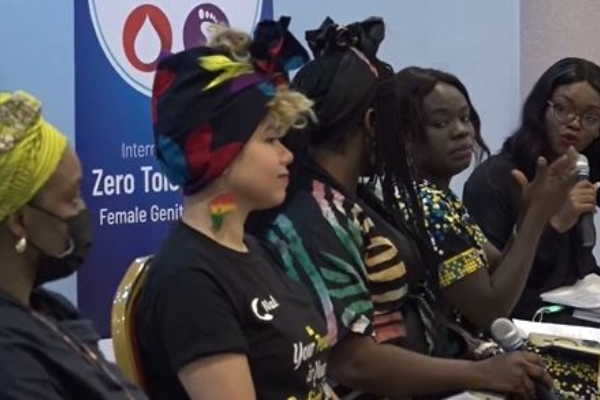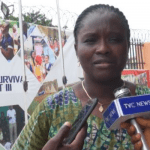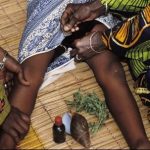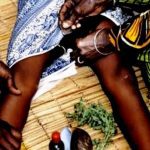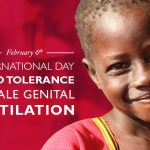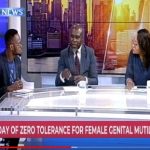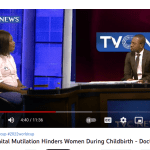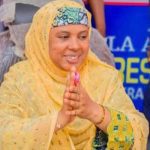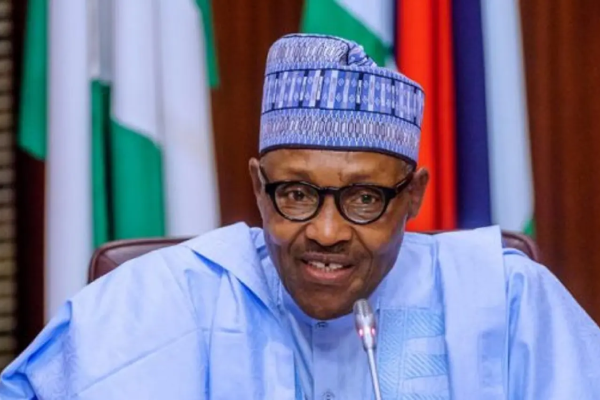Nigeria continues to be one of the nations with a high prevalence of female genital mutilation among women and girls.
But Nigerian female youths want to see more action taken against the widespread practice of female genital mutilation.
Despite years of advocacy, there has not been any encouraging progress in eradicating the menace.
[wonderplugin_video iframe=”https://youtu.be/pOA0bufQoKc” lightbox=0 lightboxsize=1 lightboxwidth=960 lightboxheight=540 autoopen=0 autoopendelay=0 autoclose=0 lightboxtitle=”” lightboxgroup=”” lightboxshownavigation=0 showimage=”” lightboxoptions=”” videowidth=600 videoheight=400 keepaspectratio=1 autoplay=0 loop=0 videocss=”position:relative;display:block;background-color:#000;overflow:hidden;max-width:100%;margin:0 auto;” playbutton=”https://www.tvcnews.tv/wp-content/plugins/wonderplugin-video-embed/engine/playvideo-64-64-0.png”]
An intergenerational dialogue was organised by the NALA Feminists Collective, a pan-African group of feminists, in partnership with the UN Population Fund to include young people in the conversation about ending FGM.
While the national prevalence of women aged 15-49 dropped from 25% in 2013 to 20% in 2018, the prevalence of young girls aged 0-14 increased from 16.9% to 19.2% during the same time period, according to the National Demographic and Health Survey, 2018.
Additional troubling information from UNICEF and UNFPA indicates that 2 million more cases could happen over the following ten years, putting 68 million Nigerian girls at risk of having their hair cut in 2020.
There are also reports of at least 200 million women and girls who have experienced this egregious violation of their human and women’s rights across more than 30 nations.https://www.tvcnews.tv/2022/07/disqualified-delta-pdp-govship-candidate-oborevwori-appeals-judgment/
This calls for concerted efforts.
the NALA Feminists Collective believes engaging youth as message bearers, will yield better results.
The group also believe youth have an advantage when it comes to using tools like social media, which can be useful for advocacy.
A minimum of 200 million women and girls in over 30 countries around the world have reportedly undergone this flagrant human and women’s rights abuse
Nigeria continues to be one of the nations with a high prevalence of female genital mutilation among women and girls.
But Nigerian female youths want to see more action taken against the widespread practice of female genital mutilation.
Despite years of advocacy, there has not been any encouraging progress in eradicating the menace.
[wonderplugin_video iframe=”https://youtu.be/pOA0bufQoKc” lightbox=0 lightboxsize=1 lightboxwidth=960 lightboxheight=540 autoopen=0 autoopendelay=0 autoclose=0 lightboxtitle=”” lightboxgroup=”” lightboxshownavigation=0 showimage=”” lightboxoptions=”” videowidth=600 videoheight=400 keepaspectratio=1 autoplay=0 loop=0 videocss=”position:relative;display:block;background-color:#000;overflow:hidden;max-width:100%;margin:0 auto;” playbutton=”https://www.tvcnews.tv/wp-content/plugins/wonderplugin-video-embed/engine/playvideo-64-64-0.png”]
An intergenerational dialogue was organised by the NALA Feminists Collective, a pan-African group of feminists, in partnership with the UN Population Fund to include young people in the conversation about ending FGM.
While the national prevalence of women aged 15-49 dropped from 25% in 2013 to 20% in 2018, the prevalence of young girls aged 0-14 increased from 16.9% to 19.2% during the same time period, according to the National Demographic and Health Survey, 2018.
Additional troubling information from UNICEF and UNFPA indicates that 2 million more cases could happen over the following ten years, putting 68 million Nigerian girls at risk of having their hair cut in 2020.
There are also reports of at least 200 million women and girls who have experienced this egregious violation of their human and women’s rights across more than 30 nations.https://www.tvcnews.tv/2022/07/disqualified-delta-pdp-govship-candidate-oborevwori-appeals-judgment/
This calls for concerted efforts.
the NALA Feminists Collective believes engaging youth as message bearers, will yield better results.
The group also believe youth have an advantage when it comes to using tools like social media, which can be useful for advocacy.
A minimum of 200 million women and girls in over 30 countries around the world have reportedly undergone this flagrant human and women’s rights abuse
Nigeria continues to be one of the nations with a high prevalence of female genital mutilation among women and girls.
But Nigerian female youths want to see more action taken against the widespread practice of female genital mutilation.
Despite years of advocacy, there has not been any encouraging progress in eradicating the menace.
[wonderplugin_video iframe=”https://youtu.be/pOA0bufQoKc” lightbox=0 lightboxsize=1 lightboxwidth=960 lightboxheight=540 autoopen=0 autoopendelay=0 autoclose=0 lightboxtitle=”” lightboxgroup=”” lightboxshownavigation=0 showimage=”” lightboxoptions=”” videowidth=600 videoheight=400 keepaspectratio=1 autoplay=0 loop=0 videocss=”position:relative;display:block;background-color:#000;overflow:hidden;max-width:100%;margin:0 auto;” playbutton=”https://www.tvcnews.tv/wp-content/plugins/wonderplugin-video-embed/engine/playvideo-64-64-0.png”]
An intergenerational dialogue was organised by the NALA Feminists Collective, a pan-African group of feminists, in partnership with the UN Population Fund to include young people in the conversation about ending FGM.
While the national prevalence of women aged 15-49 dropped from 25% in 2013 to 20% in 2018, the prevalence of young girls aged 0-14 increased from 16.9% to 19.2% during the same time period, according to the National Demographic and Health Survey, 2018.
Additional troubling information from UNICEF and UNFPA indicates that 2 million more cases could happen over the following ten years, putting 68 million Nigerian girls at risk of having their hair cut in 2020.
There are also reports of at least 200 million women and girls who have experienced this egregious violation of their human and women’s rights across more than 30 nations.https://www.tvcnews.tv/2022/07/disqualified-delta-pdp-govship-candidate-oborevwori-appeals-judgment/
This calls for concerted efforts.
the NALA Feminists Collective believes engaging youth as message bearers, will yield better results.
The group also believe youth have an advantage when it comes to using tools like social media, which can be useful for advocacy.
A minimum of 200 million women and girls in over 30 countries around the world have reportedly undergone this flagrant human and women’s rights abuse
Nigeria continues to be one of the nations with a high prevalence of female genital mutilation among women and girls.
But Nigerian female youths want to see more action taken against the widespread practice of female genital mutilation.
Despite years of advocacy, there has not been any encouraging progress in eradicating the menace.
[wonderplugin_video iframe=”https://youtu.be/pOA0bufQoKc” lightbox=0 lightboxsize=1 lightboxwidth=960 lightboxheight=540 autoopen=0 autoopendelay=0 autoclose=0 lightboxtitle=”” lightboxgroup=”” lightboxshownavigation=0 showimage=”” lightboxoptions=”” videowidth=600 videoheight=400 keepaspectratio=1 autoplay=0 loop=0 videocss=”position:relative;display:block;background-color:#000;overflow:hidden;max-width:100%;margin:0 auto;” playbutton=”https://www.tvcnews.tv/wp-content/plugins/wonderplugin-video-embed/engine/playvideo-64-64-0.png”]
An intergenerational dialogue was organised by the NALA Feminists Collective, a pan-African group of feminists, in partnership with the UN Population Fund to include young people in the conversation about ending FGM.
While the national prevalence of women aged 15-49 dropped from 25% in 2013 to 20% in 2018, the prevalence of young girls aged 0-14 increased from 16.9% to 19.2% during the same time period, according to the National Demographic and Health Survey, 2018.
Additional troubling information from UNICEF and UNFPA indicates that 2 million more cases could happen over the following ten years, putting 68 million Nigerian girls at risk of having their hair cut in 2020.
There are also reports of at least 200 million women and girls who have experienced this egregious violation of their human and women’s rights across more than 30 nations.https://www.tvcnews.tv/2022/07/disqualified-delta-pdp-govship-candidate-oborevwori-appeals-judgment/
This calls for concerted efforts.
the NALA Feminists Collective believes engaging youth as message bearers, will yield better results.
The group also believe youth have an advantage when it comes to using tools like social media, which can be useful for advocacy.
A minimum of 200 million women and girls in over 30 countries around the world have reportedly undergone this flagrant human and women’s rights abuse
Nigeria continues to be one of the nations with a high prevalence of female genital mutilation among women and girls.
But Nigerian female youths want to see more action taken against the widespread practice of female genital mutilation.
Despite years of advocacy, there has not been any encouraging progress in eradicating the menace.
[wonderplugin_video iframe=”https://youtu.be/pOA0bufQoKc” lightbox=0 lightboxsize=1 lightboxwidth=960 lightboxheight=540 autoopen=0 autoopendelay=0 autoclose=0 lightboxtitle=”” lightboxgroup=”” lightboxshownavigation=0 showimage=”” lightboxoptions=”” videowidth=600 videoheight=400 keepaspectratio=1 autoplay=0 loop=0 videocss=”position:relative;display:block;background-color:#000;overflow:hidden;max-width:100%;margin:0 auto;” playbutton=”https://www.tvcnews.tv/wp-content/plugins/wonderplugin-video-embed/engine/playvideo-64-64-0.png”]
An intergenerational dialogue was organised by the NALA Feminists Collective, a pan-African group of feminists, in partnership with the UN Population Fund to include young people in the conversation about ending FGM.
While the national prevalence of women aged 15-49 dropped from 25% in 2013 to 20% in 2018, the prevalence of young girls aged 0-14 increased from 16.9% to 19.2% during the same time period, according to the National Demographic and Health Survey, 2018.
Additional troubling information from UNICEF and UNFPA indicates that 2 million more cases could happen over the following ten years, putting 68 million Nigerian girls at risk of having their hair cut in 2020.
There are also reports of at least 200 million women and girls who have experienced this egregious violation of their human and women’s rights across more than 30 nations.https://www.tvcnews.tv/2022/07/disqualified-delta-pdp-govship-candidate-oborevwori-appeals-judgment/
This calls for concerted efforts.
the NALA Feminists Collective believes engaging youth as message bearers, will yield better results.
The group also believe youth have an advantage when it comes to using tools like social media, which can be useful for advocacy.
A minimum of 200 million women and girls in over 30 countries around the world have reportedly undergone this flagrant human and women’s rights abuse
Nigeria continues to be one of the nations with a high prevalence of female genital mutilation among women and girls.
But Nigerian female youths want to see more action taken against the widespread practice of female genital mutilation.
Despite years of advocacy, there has not been any encouraging progress in eradicating the menace.
[wonderplugin_video iframe=”https://youtu.be/pOA0bufQoKc” lightbox=0 lightboxsize=1 lightboxwidth=960 lightboxheight=540 autoopen=0 autoopendelay=0 autoclose=0 lightboxtitle=”” lightboxgroup=”” lightboxshownavigation=0 showimage=”” lightboxoptions=”” videowidth=600 videoheight=400 keepaspectratio=1 autoplay=0 loop=0 videocss=”position:relative;display:block;background-color:#000;overflow:hidden;max-width:100%;margin:0 auto;” playbutton=”https://www.tvcnews.tv/wp-content/plugins/wonderplugin-video-embed/engine/playvideo-64-64-0.png”]
An intergenerational dialogue was organised by the NALA Feminists Collective, a pan-African group of feminists, in partnership with the UN Population Fund to include young people in the conversation about ending FGM.
While the national prevalence of women aged 15-49 dropped from 25% in 2013 to 20% in 2018, the prevalence of young girls aged 0-14 increased from 16.9% to 19.2% during the same time period, according to the National Demographic and Health Survey, 2018.
Additional troubling information from UNICEF and UNFPA indicates that 2 million more cases could happen over the following ten years, putting 68 million Nigerian girls at risk of having their hair cut in 2020.
There are also reports of at least 200 million women and girls who have experienced this egregious violation of their human and women’s rights across more than 30 nations.https://www.tvcnews.tv/2022/07/disqualified-delta-pdp-govship-candidate-oborevwori-appeals-judgment/
This calls for concerted efforts.
the NALA Feminists Collective believes engaging youth as message bearers, will yield better results.
The group also believe youth have an advantage when it comes to using tools like social media, which can be useful for advocacy.
A minimum of 200 million women and girls in over 30 countries around the world have reportedly undergone this flagrant human and women’s rights abuse
Nigeria continues to be one of the nations with a high prevalence of female genital mutilation among women and girls.
But Nigerian female youths want to see more action taken against the widespread practice of female genital mutilation.
Despite years of advocacy, there has not been any encouraging progress in eradicating the menace.
[wonderplugin_video iframe=”https://youtu.be/pOA0bufQoKc” lightbox=0 lightboxsize=1 lightboxwidth=960 lightboxheight=540 autoopen=0 autoopendelay=0 autoclose=0 lightboxtitle=”” lightboxgroup=”” lightboxshownavigation=0 showimage=”” lightboxoptions=”” videowidth=600 videoheight=400 keepaspectratio=1 autoplay=0 loop=0 videocss=”position:relative;display:block;background-color:#000;overflow:hidden;max-width:100%;margin:0 auto;” playbutton=”https://www.tvcnews.tv/wp-content/plugins/wonderplugin-video-embed/engine/playvideo-64-64-0.png”]
An intergenerational dialogue was organised by the NALA Feminists Collective, a pan-African group of feminists, in partnership with the UN Population Fund to include young people in the conversation about ending FGM.
While the national prevalence of women aged 15-49 dropped from 25% in 2013 to 20% in 2018, the prevalence of young girls aged 0-14 increased from 16.9% to 19.2% during the same time period, according to the National Demographic and Health Survey, 2018.
Additional troubling information from UNICEF and UNFPA indicates that 2 million more cases could happen over the following ten years, putting 68 million Nigerian girls at risk of having their hair cut in 2020.
There are also reports of at least 200 million women and girls who have experienced this egregious violation of their human and women’s rights across more than 30 nations.https://www.tvcnews.tv/2022/07/disqualified-delta-pdp-govship-candidate-oborevwori-appeals-judgment/
This calls for concerted efforts.
the NALA Feminists Collective believes engaging youth as message bearers, will yield better results.
The group also believe youth have an advantage when it comes to using tools like social media, which can be useful for advocacy.
A minimum of 200 million women and girls in over 30 countries around the world have reportedly undergone this flagrant human and women’s rights abuse
Nigeria continues to be one of the nations with a high prevalence of female genital mutilation among women and girls.
But Nigerian female youths want to see more action taken against the widespread practice of female genital mutilation.
Despite years of advocacy, there has not been any encouraging progress in eradicating the menace.
[wonderplugin_video iframe=”https://youtu.be/pOA0bufQoKc” lightbox=0 lightboxsize=1 lightboxwidth=960 lightboxheight=540 autoopen=0 autoopendelay=0 autoclose=0 lightboxtitle=”” lightboxgroup=”” lightboxshownavigation=0 showimage=”” lightboxoptions=”” videowidth=600 videoheight=400 keepaspectratio=1 autoplay=0 loop=0 videocss=”position:relative;display:block;background-color:#000;overflow:hidden;max-width:100%;margin:0 auto;” playbutton=”https://www.tvcnews.tv/wp-content/plugins/wonderplugin-video-embed/engine/playvideo-64-64-0.png”]
An intergenerational dialogue was organised by the NALA Feminists Collective, a pan-African group of feminists, in partnership with the UN Population Fund to include young people in the conversation about ending FGM.
While the national prevalence of women aged 15-49 dropped from 25% in 2013 to 20% in 2018, the prevalence of young girls aged 0-14 increased from 16.9% to 19.2% during the same time period, according to the National Demographic and Health Survey, 2018.
Additional troubling information from UNICEF and UNFPA indicates that 2 million more cases could happen over the following ten years, putting 68 million Nigerian girls at risk of having their hair cut in 2020.
There are also reports of at least 200 million women and girls who have experienced this egregious violation of their human and women’s rights across more than 30 nations.https://www.tvcnews.tv/2022/07/disqualified-delta-pdp-govship-candidate-oborevwori-appeals-judgment/
This calls for concerted efforts.
the NALA Feminists Collective believes engaging youth as message bearers, will yield better results.
The group also believe youth have an advantage when it comes to using tools like social media, which can be useful for advocacy.
A minimum of 200 million women and girls in over 30 countries around the world have reportedly undergone this flagrant human and women’s rights abuse

